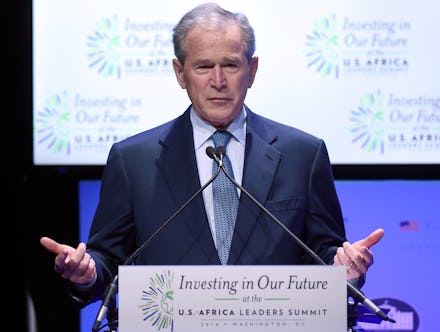Just-Released Bush Memos Show the White House Barely Able to Justify Spying on Us

The news: The U.S. Justice Department released a pair of decade-old memos Friday night that the American Civil Liberties Union (ACLU) says suggest that the "president's power to monitor the communications of Americans is virtually unlimited" when trying to gain foreign intelligence.
The memos provide legal justification for the warrantless wiretapping started by the Bush administration in the wake of 9/11. Written by Jack Goldsmith, who was the head of Bush's Office of Legal Counsel, they detail a program called "Stellar Wind" that allowed the NSA to monitor communications in the U.S. as long as one end of the communication was overseas and at least one person taking part was thought to be related to al-Qaida, according to the Washington Post.
The program was put under court control in 2007 after the New York Times exposed it two years earlier. But these memos provide the most thorough view we've ever had of the Bush administration's surveillance efforts.
The highlights: The heavily redacted memos explain at length why the executive branch is safe to continue using a program that seems blatantly unconstitutional. Goldsmith makes the case that Congress doesn't have authority over the surveillance activities:
"We conclude that the content collection activities under STELLAR WIND are precisely a core exercise of Commander-in-Chief powers to detect and engage the enemy in protecting the Nation from attack in the midst of a war and that Congress may not by statute restrict U1e Commander in Chief's decisions about such a matter involving the conduct of a campaign."
And that being at war essentially grants the president a crazy amount of power:
"When the Nation has been thrust into an armed conflict by a foreign attack on the United States and the President determines in his role as Commander in Chief and sole organ for the Nation in foreign affairs that it is essential for defense against a further foreign aHack to use the signals intelligence capabilities of the Department of Defense within the United States, he has inherent constitutional authority to direct electronic surveillance without a warrant to intercept the suspected communications of the enemy - an authority that Congress cannot curtail."
And that the president doesn't even need to be at war to wield that power:
"Even in peacetime, absent congressional action, the President has inherent constitutional authority, consistent with the Fourth Amendment, to order warrantless foreign intelligence surveillance."
The reaction: "What these memos show is that nearly three years after President Bush authorized the warrantless wiretapping of Americans' e-mails and phone calls, government lawyers were still struggling to put the program on sound legal footing," Patrick Toomey, staff attorney for the ACLU, told the Washington Post. "Their conclusions are deeply disturbing."
While such intelligence gathering now requires a court order, that doesn't exactly mean it's become harder to spy. As Mother Jones explains, the court that handles such requests has only rejected 0.03% of them. An ACLU lawsuit on the matter has so far made its way to the Second Circuit Court of Appeals in New York.
While some of the legal reasoning in these memos no longer applies, clearly things haven't changed too much. It makes you wonder what memos we'll see released a decade from now — and whether those memos will even shock us by that point.